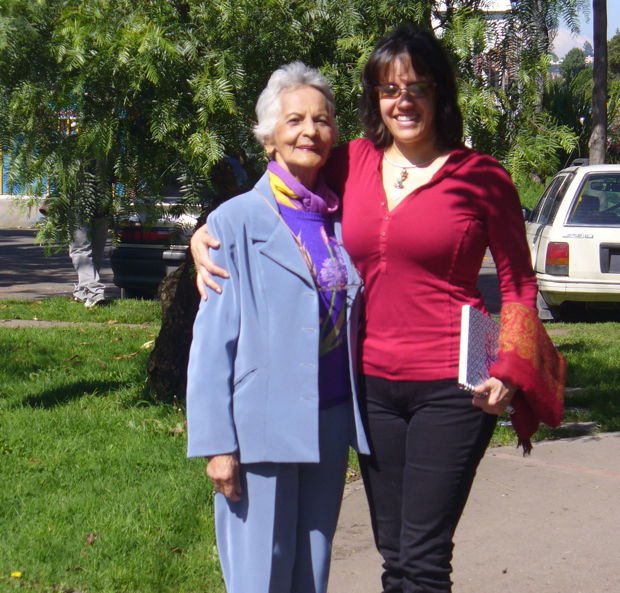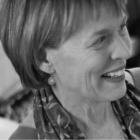Sandra, can you tell us a little about your background?
I was born in the US and raised in Colombia. I started my professional career there with Colgate Palmolive. I had studied industrial engineering but toward the end of my time in Colombia I took on an assistant brand manager job with Colgate and then came back to the States to get my MBA at the Kellogg School of Management at Northwestern University.
After my degree, I decided to stay in the US. I worked with Sara Lee Bakery on the US business side and also helped them launch the brand in over 20 countries in Latin America.
After that, I realized I really wanted something that would connect my Latin American and my US experiences, so I decided to focus on the US Hispanic market and moved on to Sears where I was eventually promoted to director of multicultural marketing.
After Sears, I worked very briefly on the Unilever account at an agency, leading the execution of the Hispanic version of the Dove Campaign for Real Beauty. Then I moved to New York to work for L’Oréal Paris.
And then, I decided I wanted to work on a project that utilized my Hispanic expertise but to the benefit of the Hispanic community. I’ve been working on how to use Hispanic purchasing power to help Latino entrepreneurs grow their businesses, to create jobs, and hopefully alleviate poverty among US Hispanics.
So that is quite a change.
To some degree, but not as much as you might think. My career choices all along involve leveraging Hispanic passion points. This change is more going from a big corporate brand that is not Latino-owned to focusing on small Hispanic-owned businesses.
Knowing the sizeable buying power of the US Hispanic community, the idea is to empower Hispanic entrepreneurs to tap into their personal experiences and deeper insights about the Hispanic community, to better meet their needs and grow sales as a result.
How large is the Hispanic community in the United States?
There are over 50 million Hispanics in the US, or 1 in 6 Americans. They have been responsible for 50% of the population growth in the past 10 years. Their buying power is over a trillion dollars a year. The only country with a larger Spanish-speaking market is Mexico. While there are about 20% of Hispanics who would be considered affluent, about 25% of Hispanics are poor compared to the national poverty rate of 14%.
This is a concern and an opportunity. How can I help connect Latino entrepreneurs with these affluent dollars so they can grow sales and eventually create jobs for Hispanics who are in poverty?
You are listed as a marketing consultant. Is that how you would describe yourself?
Yes, right now I am positioning myself as a marketing consultant to small to mid-size businesses. But I am also trying to develop some type of product or service that can make the Hispanic market more tangible, allowing Hispanic entrepreneurs to tap it for growth.
For now, I am focused on the industries that I’ve had experience with: beauty, retail, and food.
How are you going about that — what kinds of things are you doing?
It’s been a journey. The good thing is that Kellogg has some really great resources, such as the social entrepreneurship program, and a strong network. Through Kellogg I’ve met two alums that I meet with regularly to discuss ideas on how to create market-based solutions that help Hispanics prosper. They are much more experienced than I am. That is a huge blessing.
I am also reading to deepen my understanding of US Hispanic cultural factors. One book I found insightful was Being Latino in Christ by Orlando Crespo, the national director of InterVarsity’s LaFe ministry.
One of the things Crespo describes is the cultural dynamic experienced by people who have been exposed to both Hispanic and American culture, and how some have struggled with identity because they had been taught that choosing Christ equals losing Hispanic culture.
In the past, immigrants completely assimilated into the US culture. But now, you can live in a new country while retaining a lot of cultural elements from your country of origin due to the internet, travel, accessibility to TV shows from your country, and other factors. Basically you retain some culture one traits and some culture two traits. People can then choose which part of which culture they want to use for what occasion.
So, buying Latino will make sense depending on the cultural connection that a buyer makes between his or her needs and the services or products that satisfy such needs. Not all businesses will be able to draw on the Latino cultural factor.
Can you give an example of businesses drawing on the Latino cultural connection?
A simple one is restaurants and food. Even a third generation Hispanic person will have a strong connection to traditional Latin American cooking because it may remind them of special times when they had these foods with their parents and extended family. In that case, encouraging people to support or buy Latino is going to be easier.
There are other cases in which the Latino connection would be important but not essential. For example, imagine a health care insurance broker who says on his website, “Because I am Latino I can understand you.” That is an angle that can build the trust needed to attract Hispanic dollars. However, with health insurance the bigger concerns are probably cost, coverage, and size of network. A stronger benefit statement in this case would be that the insurance broker secures policies for companies with a very high number of Spanish-speaking doctors.
An example from retail is how women’s clothing is displayed. I was out for dinner in Queens with a friend of Indian heritage. When we got to the Colombian neighborhood, I pointed out to him the difference in the displays in the retail stores. In the Colombian apparel stores, the mannequins are turned with their backs facing the windows to show how the pants fit in the back because the shape of the butt is a more valued attribute among Hispanics.
Basically, I am trying to help Hispanics profit from cultural insights like these, assuming that because Latinos know Latinos best, they can really meet their needs best.
What kind of challenges do you see for women and particularly Hispanic women in business, in being part of the business world?
I have to say, I have not worked in industries where it was hard to be a businesswoman. Sears was a pretty good company for diversity as a whole, with an employee alliance network and mentoring. L’Oréal is a beauty company with mostly women. And Sara Lee had several women in leadership roles.
More than problems with being a woman, I see problems with being a minority. There are cultural expectations that we don’t know we have. Sometimes there are things about your culture that are so normal to you that you do not realize that they’re not normal to someone else. It can be hard to see the problem.
At one job, I struggled with a boss that had grown up in the US, but held a lot of values from her Chinese culture. I came along with my Latino culture. These two cultures have very different expectations about how you express your emotions. She was in a leadership role and it was a time when I felt very frustrated, so I was emoting all over the place. For a Chinese person that was not acceptable.
It was not until I was preparing for an InterVarsity MBA missions trip to Singapore and Indonesia by reading about all the cultural things you need to keep in mind that I realized fully what had been going on. I was like, “Oh! That is why we were clashing.”
This type of thing comes into play in the business world in ways you least expect it. You feel like you are this well-prepared person and don’t understand why you are having roadblocks with people. As I needed to be more aware of my Chinese boss’s background, she also needed to be more aware of mine. If we each had known a little bit more, we could have met in the middle, or at least expressed, “I don’t like it when you do this.”
Could you share with us something of your faith journey?
When I was at Kellogg I was not a Christian, but I attended the InterVarsity Fellowship there.

My grandmother was a Christian and she had heard from her pastors that the universities were wild. So she had encouraged me to meet with people in a nice Christian fellowship to have decent people to hang out with. Interestingly, I went to the InterVarsity meetings because their table at the Kellogg interest clubs fair was staffed by a Puerto Rican woman. So I thought this group must be okay. I started going to the fellowship but I never became a Christian while I was in school.
How did it happen then?
You know it was funny. My best friend during business school wasn’t a Christian and would drop me off every Wednesday at the fellowship but would never come in. Eventually she moved to a different country. Later, some people who were Christians stayed at her house abroad and shared the gospel with her and she became a Christian. She came back and told me and I said, “What?! Weren’t you good already?” I would go to church regularly but was still not a Christian. As I considered getting baptized at her urging, I intellectually understood what the gospel was, and so I prayed to ask Christ to be my Savior and Lord.
But I have to say that it really wasn’t until this year, 11 years later, that I feel like I understand grace. That is the difference. My former pastor at Park Community Church taught me how to walk with God in a living, real relationship. As I spent time in the Word, God was leading me over and over again to the book of Romans. I just spent a lot of time there, with God’s Word transforming my heart. And over the years people who know me have given me a lot of different books and CDs on grace, on love. Things like that that help. These all have been factors for me.
What is your living situation?
I am single — never married — and to be able to manage the fluctuations in income that are normal for a start-up, I decided to rent one little room in a beautiful house in Brooklyn. I put half of my stuff in storage as I’ve gone from having a 1200 foot apartment in another city to having a 1 bedroom apartment in Manhattan to having one room here!
But I feel really blessed. I love the house and this allows me to live in New York City for as little as possible. I have more of a chance to watch how immigrant consumers are living. And my neighborhood market here has a lot of great ethnic foods. I love that.
What other interests do you have?
I have been a mentor for about three years at a school called the Morris Academy for Collaborative Studies in Morrisania, Bronx, one of the poorest communities in America. Most of the students are Hispanic or black. I’ve loved my volunteer work there but I feel now I’ve been led to align my efforts more along the same lines as the business I am launching. There are a number of very, very low-income entrepreneurs that are associating in worker cooperatives so I’m looking to potentially do some work with them. Some of these decisions were inspired by Patrick Lai’s talk at the Believers in Business conference.
In my spare time, I love to dance! And I like movies. I especially love foreign films and go with a group of friends to new films whenever I can.
Do you have any words for our readers at The Well that might be going into business?
The wisest thing I’ve ever heard about how to manage a business career came from Patrick Lai at the Believers in Business Conference. He said, “Ask God what his priorities are for your background, skills, education, experience, and networks, how he wants to use them in what he wants done in the world.”
From my former pastor I have learned how to hear the answer: “Write the question on a piece of paper and keep track of everything that God says related to the topic over time — he might speak to you through a Bible verse, a mental picture, a word from a friend, a sign on the street, etc.”
One of the things God has shown me by doing this exercise is that for my endeavors and the people around me to experience growth, I need to live in the “fear of the Lord” as opposed to the “fear of man.” While this is more about the motives from which I work, through the same exercise I have also experienced the Holy Spirit telling me to ask for a particular assignment.
I also think it is critical to identify people who could be your champions. But also, watch for people you can support. Remember that everybody is valuable in the eyes of God. Build your network at all levels wherever you go.
 I met Sandra Diaz at the Believers in Business conference hosted by the Yale School of Management Christian Fellowship in New York City in February 2011. Sandra is a marketing consultant and social entrepreneur and the founder of Diaz & Co.: Hispanic Expertise That Drives Growth. Sandra launched Diaz & Co. to provide Latina entrepreneurs with access to English-Spanish resources, marketing expertise, analytical skills, and key contacts they need for success. Diaz & Co. was inspired by Sandra’s passion for mentoring individuals for professional growth and providing job opportunities for women and youth at risk.
I met Sandra Diaz at the Believers in Business conference hosted by the Yale School of Management Christian Fellowship in New York City in February 2011. Sandra is a marketing consultant and social entrepreneur and the founder of Diaz & Co.: Hispanic Expertise That Drives Growth. Sandra launched Diaz & Co. to provide Latina entrepreneurs with access to English-Spanish resources, marketing expertise, analytical skills, and key contacts they need for success. Diaz & Co. was inspired by Sandra’s passion for mentoring individuals for professional growth and providing job opportunities for women and youth at risk.



